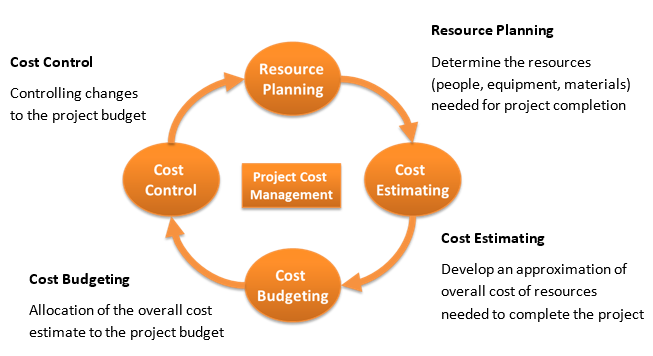Cost Management is a critical component of Project Management that involves estimating, allocating, and controlling the financial resources required for completing a project. Cost Management is important as it ensures that a project is executed within its approved budget while meeting its objectives and delivering the expected outcomes. Without Cost Management, you cannot effectively map out the expected outcome of a project.

The Crucial Role of Collaboration in Cost Management
Effective Cost Management requires collaboration between Project Managers, Quantity Surveyors, Finance Teams, and other Stakeholders. Thus, ensuring that a project is financially feasible, stays on track, and ultimately delivers value within the allocated resources.
Key Components of Cost Management: Precision in Practice
- Cost Estimation: The process of exacting cost estimation offers a forward-looking projection of the project as a whole. The importance of accurate cost estimation cannot be understated, as it acts as a safeguard against budget overruns, delays, and disruptions that result from underestimating expenditures.
- Cost Allocation: Once the overall Project cost is estimated, it needs to be allocated to specific project activities, tasks, or work packages. This involves breaking down the project into smaller components and assigning estimated costs to each of them This approach effectively prevents imbalanced expenditure and allows insight into the project’s financial breakdown for all parties.
- Budget Development: The budget serves as a financial roadmap for the Project. With the costs allocated to individual project components, a budget is developed that outlines the estimated costs for each phase, task, or activity.
- Contingency Planning: Contingency budgets function as a safety net against unforeseen financial deviations, and are instrumental in diminishing the impact of unexpected events and helps to mitigate the risk of cost overruns.
- Cost Control: Throughout the project’s lifecycle, it’s crucial to monitor and control costs to ensure they stay within the approved budget. This practice safeguards against excessive spending and maintains the project’s adherence to its financial goals. Regular tracking of actual costs against the budgeted costs helps identify any discrepancies early on.
- Variance Analysis: Scrutinising project progress through variance analysis highlights deviations from the budget, enabling project managers to make adjustments and steer the project back on course.
- Change Management: Changes to project scope, requirements, or other factors can impact costs. It is important to have a change management process in place to assess the financial implications of proposed changes and adjust the budget as necessary. Effective change management safeguards against possible project disruptions.
- Reporting: Consistent and regular financial reporting gives stakeholders insights into planned versus actual costs, forecasts, and deviations which helps ensure well-informed decision-making. A strong communication framework and precise reporting are vital components of effective cost management. Regular updates on financial health empower stakeholders with insights, facilitating collaboration and informed decision-making.
Case Study 1: £500K Savings on a Residential Project, London
Challenge: Delivering a high-quality 654-unit development with optimal ROI.
Solution: Proficient Design and cost Engineers conducted an Early MEP Risk Audit (EMRA), streamlining designs and optimizing building services solutions. This included rationalising the layout of the plant room and equipment, ensuring optimal pipe and cable sizing, and recommending alternative building services solutions.
Value: The EMRA identified potential savings of £500,000 alongside streamlined construction timelines.
Example 2: 10X ROI on a Student Accommodation Project, Ireland
Challenge: Delivering a premium 924-bed development with maximized value.
Solution: Accomplished Design and Cost Engineers conducted an in-depth design analysis, uncovering deficiencies in the Mechanical and Electrical Designs.
Value: An added investment of €180,000 at the initial design stage averted significant construction costs, yielding a remarkable 10X ROI while ensuring the project was delivered on time and released to market as originally planned.
From reining in budgets to embracing change, cost management acts as the compass steering construction projects toward successful completion. It bridges the gap between aspirations and reality, ensuring projects flourish amidst the complexities and financial intricacies that large-scale developments bring.
